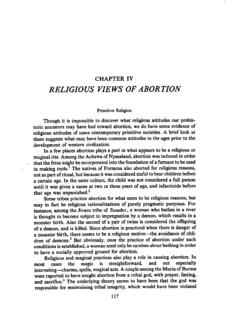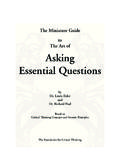Transcription of A letter to the Supreme Pontiff Francis, to all bishops in ...
1 THE MISUSE OF AMORIS LAETITIA TO SUPPORT ERRORS AGAINST THE CATHOLIC FAITH A letter to the Supreme Pontiff Francis, to all bishops in communion with him, and to the rest of the Christian faithful John Finnis and Germain Grisez Code of Canon Law Book II, Part I, Title I: The Obligations and Rights of All the Faithful, canon 212 3: According to the knowledge, competence, and prestige which they possess, they have the right and even at times the duty to manifest to the sacred pastors their opinion on matters which pertain to the good of the Church and to make their opinion known to the rest of the Christian faithful, without prejudice to the integrity of faith and morals, with reverence toward their pastors, and attentive to common advantage and the dignity of persons. - 1 - our Holiness, Pope Francis; Your Excellencies, all bishops in communion with him; and all of our other Brothers and Sisters in the Lord Jesus Christ: We are convinced that certain statements in the Apostolic Exhortation Amoris Laetitia, and certain omissions from it, have been misused and/or, unless prevented, will be misused to support positions that are or include errors against the Catholic faith.
2 We shall identify eight such positions, explain how AL is used to support each of them, and show how each either is or includes error against the Catholic faith. Proponents of the erroneous positions may respond that their readings of AL are accurate, and that the Exhortation overrides and supersedes the sources we quote from or cite to show that the positions they defend are errors against the Catholic faith. But in making such a response, as in holding their positions, they would neglect what it is for bishops of the Catholic Church to bishops are successors of Peter and the other Apostles. They act in persona Christi when, in carrying out their duty of teaching on matters of faith and morals, they identify propositions that call for the assent of the faithful. If they do what they should, they teach truths, primarily truths that were entrusted by Jesus to his Church and secondarily truths needed to guard the primary ones as inviolable and/or to expound them with fidelity.
3 Whether primary or secondary, such truths can never supersede or annul one another. All statements by bishops carrying out their duty of teaching on matters of faith and morals must therefore be presumed to be attempts to articulate truths that belong to one and the same body of truths to be believed with Catholic faith. These statements, therefore, must be presumed to be, when carefully interpreted, consistent with one another. It is a misuse of a teaching statement to claim its support without first seeking to interpret it accordingly. If, despite careful interpretation seeking consistency, there nevertheless emerges an inconsistency, a teaching statement that is not itself definitive must be understood with qualifications and delimitations sufficient to render it consistent with Scripture and the teachings that definitively pertain to Tradition, interpreted in each other s light, and so to clarify the truths the pope or other bishop or group of bishops who issued it appears to have been trying to articulate.
4 1. Our exposition follows the lead given by the Pastoral letter of Archbishop Sample of Portland, Oregon, On the Reading of Amoris Laetitia in light of Church Teaching (published 7 October 2016), which illuminates the Apostolic Exhortation and three misuses of it, in the light of the Second Vatican Council s reaffirmation of the scriptural and traditional teaching that, in Archbishop Sample s words, the Magisterium itself is not superior to the Word of God, but is its servant. It teaches only what has been handed on to it . The Gospel remains always whole and alive. preserved by an unending succession of preachers until the end of time, who handing on what they themselves have received, warn the faithful to hold fast to the traditions which they have learned .. (internal quotations from Catechism of the Catholic Church 86, citing Vatican II, Dogmatic Constitution on Divine Revelation, Dei Verbum, 10; and from Dei Verbum, 8).
5 Y - 2 - Since we shall deal in this letter only with the misuse of AL to support positions held by some theologians and pastors who are not teaching in persona Christi, we do not here assert or deny that teachings in AL need to be qualified and delimited. Nor do we make any suggestions about how that might be done, were it needed. _____ he issue of admission to Communion for the divorced and remarried, discussed at length during the 2014 and 2015 sessions of the Synod of bishops , involves the question of whether, at least under some conditions, priests administering the Sacrament of Recon-ciliation should absolve penitents who lack a purpose of amendment with respect to some sin in grave matter. Some Catholic theologians and pastors have held, at least implicitly, and some will likely hold explicitly: Position A: A priest administering the Sacrament of Reconciliation may sometimes absolve a penitent who lacks a purpose of amendment with respect to a sin in grave matter that either pertains to his or her ongoing form of life or is habitually repetitive.
6 Proponents may suggest that, in place of a purpose of amendment, such penitents should meet three conditions: regret for sinning (to keep in view the ideal from which they are falling short); ongoing penance (to counterbalance their ongoing sin); and an effort to mitigate harm to others (to cover their sinning with love for others).2 Proponents of Position A will claim that AL strongly and clearly, even if only implicitly, supports their view. They will point out that early in chapter eight, which concerns those in various situations of weakness or imperfection, AL 296 makes clear to the whole Church, lest we take the wrong path, that There are two ways of thinking which recur throughout the Church s history: casting off and reinstating. The Church s way, from the time of the Council of Jerusalem, has always been the way of Jesus, the way of mercy and reinstatement.. The way of the Church is not to condemn anyone for ever; it is to pour out the balm of God s mercy on all those who ask for it with a sincere heart.
7 For true charity is always unmerited, unconditional and gratuitous. [326] Consequently, there is a need to avoid judgements which do not take into account the complexity of various situations and to be attentive, by necessity, to how people experience distress because of their condition. [327]3 2. AL 306: In every situation, when dealing with those who have difficulties in living God s law to the full, the invitation to pursue the via caritatis must be clearly heard. Fraternal charity is the first law of Christians (cf. Jn 15:12; Gal 5:14). Let us not forget the reassuring words of Scripture: Maintain constant love for one another, for love covers a multitude of sins (1 Pet 4:8). This and all subsequent English-language quotations from papal teachings and the documents of Vatican Council II are taken from < >. 3. AL 296 (ellipses his); note 326: Homily at Mass Celebrated with the New Cardinals (15 February 2015): AAS 107 (2015) 257; note 327: Relatio Finalis 2015, 51.
8 T - 3 - 297. It is a matter of reaching out to everyone, of needing to help each person find his or her proper way of participating in the ecclesial community and thus to experience being touched by an unmerited, unconditional and gratuitous mercy. No one can be condemned for ever, because that is not the logic of the Gospel! Here I am not speaking only of the divorced and remarried, but of everyone, in whatever situation they find themselves. Position A s proponents will say that AL 297 plainly extends to all ongoing and habitually repetitive sinners the preceding paragraph s clear and very firm directive to reinstate, not condemn, which might have been thought to apply only to the divorced and remarried. Anyone who approaches the Sacrament of Reconciliation, proponents will argue, is asking for God s mercy with a heart that should be presumed to be sincere. Condemning such penitents forever is at least a terrible risk involved in demanding of them a purpose of amendment that they may be unable to provide sincerely.
9 To demand it of them as a condition for absolution is at least to set a condition for the balm of God s mercy and to make a judgment that cannot possibly take into account everything that constitutes their concrete situation and how they themselves think and feel about its troubling and painful aspects. Proponents of Position A also will argue that AL 304 s observation that general rules .. cannot provide absolutely for all particular situations applies to the general rule that a purpose of amendment is required of all penitents with respect to their sins in grave matter. Therefore, simply to apply that rule to penitents who admit that their sinfulness will be ongoing is to treat the rule as if it were a stone to throw at people s lives. This would bespeak the closed heart of one used to hiding behind the Church s teachings, sitting on the chair of Moses and judging at times with superiority and superficiality difficult cases . 4 Proponents also will argue that only putting Position A into practice will take adequate account of the fact that penitents who sin in grave matter, including those who accuse themselves of mortal sin, may well be sinning only venially: Because of forms of conditioning and mitigating factors, it is possible that in an objective situation of sin which may not be subjectively culpable, or fully such a person can be living in God s grace, can love and can also grow in the life of grace and charity, while receiving the Church s help to this end.
10 [351] Discernment must help to find possible ways of responding to God and growing in the midst of limits. By thinking that everything is black and white, we sometimes close off the way of grace and of growth, and discourage paths of sanctification which give glory to God. (AL 305) Proponents will point out that note 351 begins: In certain cases, this can include the help of the sacraments. Hence, I want to remind priests that the confessional must not be a torture chamber, but rather an encounter with the Lord s mercy . 5 4. AL 305; the internal quotation is from Address for the Conclusion of the Fourteenth Ordinary General Assembly of the Synod of bishops (24 October 2015): L Osservatore Romano, 26 27 October 2015, p. 13. 5. Note 351 goes on: (Apostolic Exhortation Evangelii Gaudium [24 November 2013], 44: AAS 105 [2013], 1038). I would also point out that the Eucharist is not a prize for the perfect, but a powerful medicine and nourishment for the weak (ibid.)








